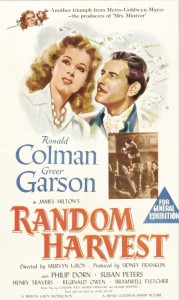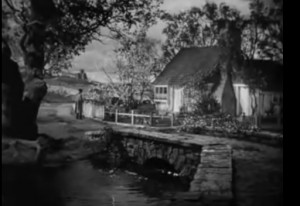 I tend to watch Random Harvest every Christmas. Funny, as I don’t think it actually contains any Christmas scenes. It’s a story that’s probably considered trite today, with a plot device that seems contrived: a World War I Captain (Ronald Colman) gets amnesia after suffering a trauma in the trenches at Arras. He establishes a new identity as “John Smith,” falls in love, gets married, becomes a father… then slips in the mud in front of a taxi cab, gets bonked on the head, recovers his original identity… and forgets that he was John Smith, a man with a family. Now aware that he’s Charles Rainier, a wealthy industrialist, he spends years searching for his lost identity.
I tend to watch Random Harvest every Christmas. Funny, as I don’t think it actually contains any Christmas scenes. It’s a story that’s probably considered trite today, with a plot device that seems contrived: a World War I Captain (Ronald Colman) gets amnesia after suffering a trauma in the trenches at Arras. He establishes a new identity as “John Smith,” falls in love, gets married, becomes a father… then slips in the mud in front of a taxi cab, gets bonked on the head, recovers his original identity… and forgets that he was John Smith, a man with a family. Now aware that he’s Charles Rainier, a wealthy industrialist, he spends years searching for his lost identity.
I guess, when you try to explain it, it does sound a little contrived. And the wonderful Carol Burnett spoof of it from the 1970s doesn’t help its case. Still, it’s a moving and emotionally satisfying story, and it was created by the talented James Hilton, who also wrote Lost Horizon. That’s another story about a man who establishes a whole new life in a far-off, almost imaginary place, then loses it and must fight to get it back.
[SPOILERS AHEAD!]
Random Harvest, a very sentimental story, uses a device I don’t tend to care for. But it works well. The device is sadness. Both halves of John Smith / Charles Rainier’s life are tinged with sadness. As Smith, he’s a mental patient who can’t form a sentence easily. He has a lost-little-boy quality that makes singer Paula Ridgeway (Greer Garson) fall for him. Their life together has a bit of a desperate quality, overshadowed by the fear that Smith will be taken back to the asylum, that he might really be a “loonie,” that he’d be incomplete, unable to function, if he were separated from Paula. They live in a sort of glamorous poverty in a little stone house in Clevedon, in Somerset.
 Ironically, it’s the sadness that makes their life together worth fighting for. Although it seems that Smith’s “little family” is a bit pathetic, the sympathy they inspire makes the viewer want them to be okay. Strange, no? You look at their lives and think, “I wouldn’t want to be those people,” and yet you treasure them all the more for it.
Ironically, it’s the sadness that makes their life together worth fighting for. Although it seems that Smith’s “little family” is a bit pathetic, the sympathy they inspire makes the viewer want them to be okay. Strange, no? You look at their lives and think, “I wouldn’t want to be those people,” and yet you treasure them all the more for it.
The story gets even sadder. Smith leaves Paula’s side long enough to go to Liverpool for a job interview, and that’s where the taxi hits him. He goes on with his life as Rainier, unaware that he’s left a wife and son to wonder where he is. As he’s rebuilding himself as a prince of industry, his biological heir, all unknown to him, dies of the flu.
I don’t normally like stories where children die. Except Dead Boy Detectives, and that’s different. To me, the death of a child is the ultimate horror, and it’s not one I care to toy with. But, again, as Rainier wonders why his very successful life is not making him happy, as he wonders what and who he left behind, I can’t help really feeling for this poor guy who said goodbye to his little son one bright morning… and never saw him again… didn’t know he had a son anymore… didn’t know that son had died.
I won’t tell the ultimate end, but, again, it’s satisfying… if tinged with sadness. Yet it’s the sadness that makes it so much more special. I suppose, when we’re a little sad, we realize how precious what we have can be. That makes us a appreciate it in a way being happy just can’t.
An interesting storytelling device… but use it sparingly.

I think you’ve written a great article–I’m looking forward to the movie.
Nice analysis of one of my favorite movies.